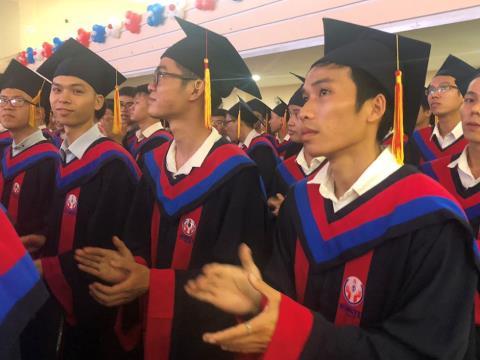The Ministry of Education and Training (MOET) intends to eliminate the difference between full-time and in-service bachelor’s degrees. Under the draft of a legal document that the ministry is compiling, the bachelor’s degree will not specify if learners finished full-time or in-service training courses. The degree would only show the university and major.

Explaining this, the ministry said there was no need to clarify the mode of training learners follow. Universities will only grant bachelor’s degrees if students can meet the standards and requirements set by the universities.
The ministry affirmed that this is a reasonable decision because this has been applied in many countries in the world, and that Vietnam needs to follow the international practice.
However, the explanation by MOET cannot persuade education experts.
| Under the draft of a legal document that the ministry is compiling, the bachelor’s degree will not specify if learners finished full-time or in-service training courses. The degree would only show the university and major. |
The problem is that the quality of full-time and in-service training quality in Vietnam is ‘different as chalk and cheese’.
In legal documents, the bachelor’s degree granted to students finishing full-time training courses has the same value with the degree granted to students finishing in-service training courses. However, in reality, the two kinds of bachelor’s degree have different value in the eyes of employers.
Full-time training graduates are believed to have better qualifications than in-service training graduates because they have to satisfy stricter requirements to be able to enroll in schools.
The intention by MOET to not specify the training mode in bachelor’s degree has also been opposed by full-time students. They said it is unreasonable for MOET to equate high-quality and low-quality training modes.
Pham Tat Dong, deputy chair of the Vietnam Study Encouragement Society, former deputy chair of the Central Propaganda Committee, said the opposition is understandable as people still have doubts about the training quality.
He said ‘international practice’ must not be the reason for Vietnam to do this, because there is a big difference between Vietnam and other countries’ training quality.
“MOET cites international practice but Vietnam’s education is very different from international education in many things, from mode of training, graduate quality and compatibility with the labor market,” he commented.
Developed countries have very good lifelong learning networks and great open educational resources which allow people to study and contribute to training at any time they want. Besides, they have online learning systems for anyone to learn anywhere. Only a computer with internet connection is enough for people to cultivate knowledge. However, Vietnam doesn’t have such good favorable conditions.
Mai Lan

Higher education tuition concerns poor students
The PM has allowed 23 state-owned universities to apply the autonomy mechanism, which means that the schools have the right to set tuition themselves.
 Education experts have warned that new policies would lead to the mass production of bachelor’s and master’s degree holders.
Education experts have warned that new policies would lead to the mass production of bachelor’s and master’s degree holders.